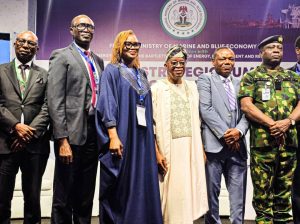VIN Quagmire: Customs Bows under pressure, promises a review before implementation

With the stand – off between Customs Brokers and the Nigeria Customs Service not abetting, the Nigeria Customs Service it seems, has bowed to pressure.
The NCS has agreed to go back to fine-tune the controversial VIN VALUATION policy.
The NCS through its representatives at
a town hall meeting called for the resolution of the on- going strike against the implementation of the newly introduced Vehicle Identification number (VIN), at Customs training School Ikeja on Tuesday, pleaded with the Customs Brokers to give them sometime to get back to the Customs Management, with a promise to review and fine-tune the contentious Vin Valuation.
However, Customs Agents cutting across all known Customs Agents Associations, thronged the venue in their numbers to reel out a plethora of grievances on the formulation and hurried implementation of the new valuation policy on vehicles.
The Agents complained that VIN VALUATION has only succeeded in inputting an astronomical jack – up of the valuation of imported fairly used vehicles.
According to them, a fairly used Pontiac 2009 model, which was before now valued at N400.000 is now valued at N1.7m by artificial intelligence or VIN VALUATION.
The Agents were of the view that Vin valuation did not accommodate legal Notice, Depreciation Value and Salvage Value. They also complained that the new use of artificial intelligence does not recognize used vehicles when inputted, rather it sees every input as new. Hence the astronomical jack up in valuation. They questioned the use of artificial intelligence and how this can work in real transaction.
The Agents also pointed out that there was no consultation with the Freight Forwarders, Importers and manufacturers, the formulators of this system were accused of neglecting well meaning stakeholders’ inputs. This, according to many speakers, is the Achilles heel of the VIN VALUATION.
They therefore asked the Committee to go back to the drawing board, taking into cognizance all that has been highlighted, while also taking inputs from other well meaning stakeholders.
In their view, over 85 percent of all imported vehicles into Nigeria are used vehicles and there’s no way VIN VALUATION will work in its present state as it Contravenes all known laws of national and international valuation.
The freight Agents also complained that they had reached out to Customs high Command but their notice was ignored as usual before the strike action. They also alluded to the target given the NCS by the Federal Government as why the Customs had to hurriedly impose values on vehicle imports.
Responding, ACG Zone A, Mrs. Modupe Aremu representing the CGC Hameed Ali said that it was not out of place for family members to quarrel but people emerge stronger from such quarrels.
In her view, strike should be the last resort, VIN VALUATION has been introduced to enhance revenue and professionalize the industry. ” This meeting is to resolve all the concerns raised by Agents and Importers,” she said.
ACG Hamza Gumi, in charge of T&T, giving a response to the Agents explained that VIN VALUATION has taken years to plan but only started implementation recently, not because of the target given to the Service as speculated. According to him, the process of vin valuation started in 2018, the idea was to harmonise the valuation process in all Customs Commands.
To Compt. Yusuf Malanta, CAC Apapa Area1 Command and A .A Oloyede, CAC Nigeria Customs Service, TinCan Island Command, the world has moved from manual valuation to artificial intelligence and are now talking about automation. The NCS they rationalise, is in the right track, even as artificial intelligence is backed up by law.
At the end, it was resolved that all the concerns raised by the Agents will be looked into by the Service, even as the Agents appealed for vin valuation to be suspended until fully harmonised.
After listening to the complaints of the stakeholders, the the NCS, as represented, agreed to go back to the drawing board with a view to making inputs that will not only be acceptable to stakeholders but those that are practicable, workable and acceptable to both Customs brokers and the Service.






